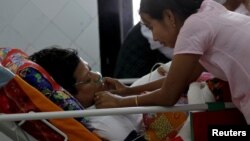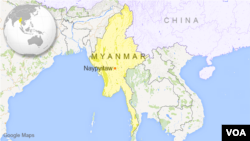A U.N. human rights investigator called Thursday for free elections in Myanmar, even as an opposition rally there was attacked, leaving a local lawmaker wounded.
Officials say several men armed with machetes or knives attacked the rally being held in Yangon late Thursday by the National League for Democracy, or NLD.
Naing Ngan Lynn, a local lawmaker running for a seat in the regional assembly, was hospitalized and two other men were injured in the attack. Officials say at least two of the attackers were arrested, adding a motive has not been determined.
The attack is likely to raise fears of violence ahead of Myanmar's general elections scheduled for November 8. It will be the first general election in 25 years in the formerly junta-ruled nation, also known as Burma.
The U.N. special rapporteur on the situation of human rights in Myanmar called for the election to be inclusive, free and credible.
“The elections, which will take place in a short time, will be an important milestone in the democratic transition process,” Special Rapporteur Yanghee Lee told reporters.
Lee expressed concern that universal rights such as freedom of expression, assembly and association have been stifled. “Genuine elections cannot be achieved if these rights are curtailed,” she said.
Lee said it is worrying that people trying to exercise these rights have been arrested and some convicted.
Muslims excluded
Lee also addressed religious discrimination, saying many Muslim voters and candidates are being excluded, including some who already hold seats in parliament.
She says in her report that the highest number of disqualified candidates are from Rakhine State, with many Muslim candidates among them. Among voters, Lee says nearly 800,000 people who had the right to vote in the 2010 and 2012 elections have had their temporary registration cards declared expired and cannot vote in November. This includes many people of Chinese and Indian origin, but mainly Rohingya in Rakhine State.
The special rapporteur also warns that large numbers of people in conflict-affected Kachin and Northern Shan States, and in flood-affected Chin State may be excluded from the vote, which could lead to further feelings of disenfranchisement after the election.
Lee said four years of reform have “undeniably improved” the human rights situation in Myanmar, but that it must continue to be a priority in the reform process.
Special rapporteurs are independent experts appointed by the U.N.’s Human Rights Council to report on specific human rights issues.
The election is expected to result in major gains for the NLD, Myanmar's main opposition party, which is led by opposition leader Aung San Suu Kyi.
But the Nobel Peace Prize winner is not eligible to become president. The country's military-drafted constitution excludes her from the position because her two sons hold foreign citizenship.





